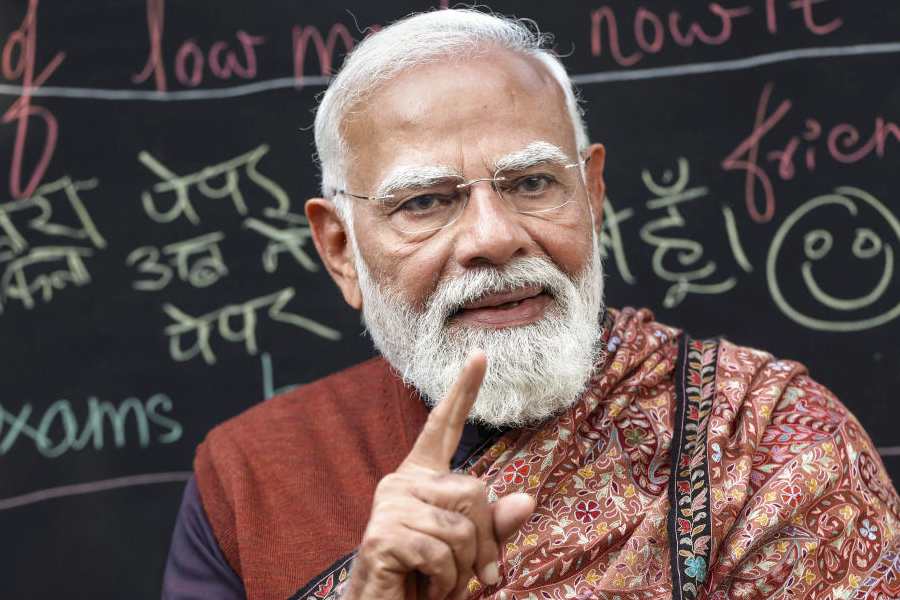 |
| A scene from Manoj Mitra’s Sajano Bagan |
A first for Bengali theatre is the upcoming Comedy Carnival organised by eight city-based groups from December 14 to 21 at Madhusudan Mancha. The organisers hope to make this an annual event.
Starting with Charbak’s Chalo Potol Tuli, through Nat-Ranga’s Gulbaj, Aneek’s Adventure Karey Koy, Rangroop’s Byaram Biram, Sangstab’s Mushtijog, Ekush Shatak’s Krishna Ranga and Natasena’s Garur Garir Headlight, it ends with Sundaram’s black comedy Sajano Bagan.
Though the satires of Michael Madhusudan Dutta and Amritalal Basu’s farces were among the first Bengali plays to be written and comedy has always occupied an important place in Bengali theatre, films and culture, group theatre here has traditionally shied away from it.
For long, comedy was thought to belong only to the commercial stage, where powerful comedians like Tulsi Chakraborty, Bhanu Bandyopadhyay, Jahar Roy, Rajlakshmi Devi (senior), Gita Dey, Mamata Bandyopadhyay, Rabi Ghosh and Santosh Dutta held sway. Group theatre was not interested till the end of ’70s.
“For a long time, intellectuals seemed to look down on comedy as frivolous and commercially motivated. They were not willing to consider actors like Tulsi Chakraborty and Chhabi Biswas seriously, though they talked of Charlie Chaplin and Laurence Olivier,” says playwright and actor Manoj Mitra. “But comedy is just as strong a medium of expression as tragedy or serious theatre, if not more.”
He feels the reason we have so few comic actors may be the fact that comedians can’t just be funny; it has to come from inside. They have to possess a talent to look differently at things, a sense of timing, proportion, sensitivity and spontaneity. “It is encouraging that new theatre groups are seeking out comedies,” he adds.
From the late 70’s, Mitra has continued to do plays sparkling with laughter: satires like Narak Guljar and Rajdarshan, black comedies and farces like Sajano Bagan, Parabash, Kinukaharer Thetar and Paliye Berai.
Saroj Roy’s Garur Garir Headlight has had several shows since its debut in 1972. Billed as a “nonsense comedy”, the play says that disaster awaits those who bite off more than they can chew, like the owner of an oil mill who attempts to start a theatre group in his wife’s memory.
Charbak’s Chalo Potol Tuli is a dramatisation of several Shibram Chakravarty stories by Arindom Ganguly. The play about a hypochondriac has been “a roaring success,” says actress Kheyali Dastidar.
Satirical references to medical practitioners and journalists appear in Rangroop’s Byaram Biram. The play gets an offbeat treatment by director Sima Mukhopadhyay, who points out that adaptations of foreign comedies like Moliere’s plays have been very successful in Calcutta.
Ekushe Shatak’s Krishna Ranga is a sex comedy adapted from Peter Shaffer’s Black Comedy. Nat-Ranga’s Gulbaj “is a black comedy on the life of a loner”, says writer director Sohan Chattopadhayay.
Adventure Kare Koy, to be staged by Aneek, is about a zamindar-turned-miserly businessman who decides to marry Dolly, a boutique owner. In Mohit Chattopadhyay’s Mushtijog, a man thought to be a coward discovers his strength under the pressure of circumstances. “It is a serious play with comic elements,” says director Dwijen Bandyopadhyay.










